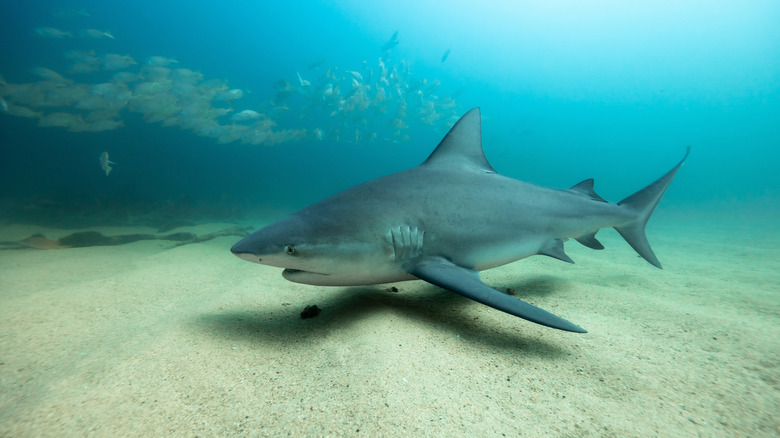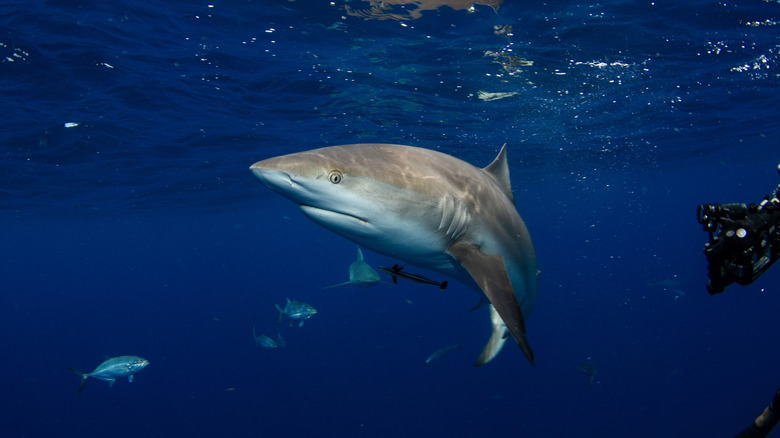Here's Why It's Impossible For (Most) Sharks To Live In The Great Lakes
If you grew up in the Midwest, you heard a story about sharks in the Great Lakes at some point. Maybe you believed it. The tens of thousands of lakes spread across Minnesota, Wisconsin, and Illinois are known for their murky, mysterious vibe; why would the Great Lakes, big enough to be considered inland seas by any standard, be any different? The sharks would have plenty of room to avoid detection. And given that goldfish don't actually have three-second memories, maybe we are wrong about this fishy fact, too?
Despite the intrigue, the idea of sharks in the Great Lakes is essentially a scientific nonstarter. The reason comes down to basic biology. Most shark species evolved in salty environments, and freshwater disrupts their biological systems, causing chaos by messing with their senses, causing dehydration, and interfering with their reproductive processes. And because they lack the air bladders that fish have, sharks in freshwater are likely to sink to the bottom of whatever unfamiliar home they've found themselves in. Osmoregulation, the process by which sharks maintain the correct balance of salt and water in their bodies, comes into play here.
Sharks hydrate themselves by absorbing small amounts of saltwater through their gills. A gland in their digestive system flushes out excess salt, but they retain enough so that the salt content in their bodies balances with that of the water around them. This osmotic balancing act reduces the loss of vital cellular water to the ocean. In freshwater, sharks have the opposite problem. Osmosis will try to equalize the high salt concentration in the shark's body with its environment, and the sudden influx of freshwater will overwhelm the shark's system. But as it turns out, this is only true for all but one species of saltwater shark.
Why bull sharks can survive in freshwater
Unlike most of their saltwater cousins, bull sharks are capable of moving from saltwater to brackish water (water that's less salty than true saltwater but more salty than freshwater) and from brackish to freshwater. This is due to their unique ability to rapidly adjust their internal salt levels through an advanced osmoregulatory system. Their kidneys and special glands work overtime to retain or expel salt depending on the environment they find themselves in, giving the species access to ecosystems most sharks can't enter. The adaptation is so efficient that bull sharks have even been found in North Carolina's Neuse River. Then there's the legend of the bull shark that swam up the Mississippi River as far as Alton, Illinois, in 1937, just shy of Lake Michigan.
The story details two local fishermen whose traps were being damaged by an unknown predator. Building a stronger trap, the two supposedly dragged an 85-pound bull shark out of the water. Locals took a photo, and scientists later confirmed that a photo dated to around that time from the area does display a bull shark. However, doubts exist as to whether the shark was caught elsewhere and brought there for a prank or is actually genuine.
No hard evidence exists to support the Illinois legend (though you can see great white sharks when in Massachusetts). Juvenile bull sharks, however, have historically been found in the Mississippi where it meets the Gulf of Mexico, indicating that bull sharks likely use the area as a breeding ground. That's smart strategy — if you can give birth to and raise your babies in a part of the water that shark predators can't access, they'll have a much higher chance of survival. Regardless, the myth of the Great Lakes shark remains just that.
Why even bull sharks can't thrive in the Great Lakes
Let's say a bull shark did manage to swim upstream from the Gulf of Mexico and survive the journey to Lake Michigan. It wouldn't last long. The Great Lakes are simply too cold, too fresh, and too isolated for sharks to thrive. Most shark species, bull sharks included, prefer water temperatures well above 70 degrees Fahrenheit. Long periods of cold exposure can lead to hypothermic stress and death in bull sharks. The Great Lakes routinely drop below 40 degrees in winter and rarely climb past the low 70s in summer. Add to that the network of human-made barriers separating the Mississippi from the lakes, including electric dispersal barriers and a maze of locks and dams, and you've got a gauntlet no shark is likely to complete alive.
There's also the issue of habitat and food. The open, cold, and low-salinity waters of the Great Lakes simply don't support the prey species most sharks rely on. Despite their adaptability, bull sharks usually only tolerate environments outside of saltwater conditions in warm, brackish coastal waters and tropical rivers, such as those found in the Amazon.
Interestingly, sharks that specialize in freshwater do exist, just not in North America. A rare genus known as Glyphis includes species like the Ganges shark and the northern river shark, which live in warm, muddy rivers in places like India, Papua New Guinea, and Western Australia. These sharks are specially adapted to their environments, but their global range is limited, and little is known about them due to habitat loss. So, while the idea of freshwater sharks isn't fiction, their presence in the Great Lakes is. But who knows? We've been wrong before, like that time everyone thought this 400-million-year-old fish was extinct.


